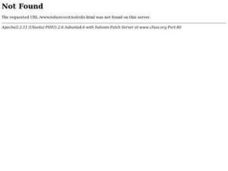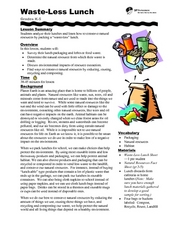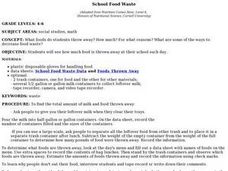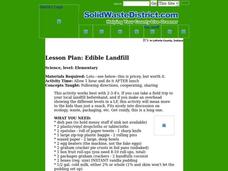Curated OER
Eco-Healthy Lunch
Students plan healthy lunches and how to dispose of their lunch waste. For this pre-field trip lesson, students and teachers plan healthy, nutritious lunches to bring on a field trip. They also discuss how to sort their garbage into the...
Curated OER
Solid Waste and Recycling
Students demonstrate effects of waste on environment and ways of reducing it, observe how much packaging goes into bag lunches each day, and survey their families to assess awareness levels and household recycling practices. Lessons all...
Curated OER
The Waste-Free Lunch
Reusable packaging for school lunches seems like a wonderful and eco-friendly idea; however, some children are being chastised for not following one school's guidelines. This New York Times article engages learners in reading...
Purdue University
Food Waste Solutions
Easy doesn't always mean better. In an era with pre-packaged everything, learners consider the environmental impact of the convenient trend. They critique the packaging of food and how waste impacts cost and then look for solutions.
SF Environment
Waste-Less Lunch
Is it possible to have a waste-less lunch? Can your class become leaders in conservation? Discuss the importance of reducing waste during lunch time with a fun lesson plan that can be extended to everyday practices. First the class...
Curated OER
Vermiculture Food Waste Compost Program for Touchstone School
Students explore the advantages of composting. In this recycling lesson students complete a worm compost project and collect food waste to feed them.
Curated OER
Solid Waste Recycling
Pupils plan a "no garbage" lunch and hold a classroom contest to sort grabage into what can and what can't be recycled. They assess the importance of reducing the amount of garbage in the environment and set up a book recycling program.
Curated OER
Lunchroom Trash
Students explore the amount of waste produced by humans. In this ecology instructional activity, students predict which lunch bag and its contents will produce the most waste. Leftover material is examined, amounts are recorded, and a...
Curated OER
How Long Until Dirt
Third graders examine the difference between composting and wasting food. They problem-solve what to do about leftovers after lunches so good food doesn't go to waste.They study food storage techniques that are environmentally friendly...
Curated OER
Collective Compromise
Students explore the concept of philanthropy. In this service learning lesson, students examine what to do with waste as they plan and implement a strategy for controlling their school's trash.
Curated OER
Being Resource-ful
Students compare the amount of waste that comes from different bags of equivalent amounts of potato chips and decide which would produce the least amount of waste. They discuss recycling and other ways they can reduce waste.
Curated OER
School Food Waste
Students see how much food is thrown away at their school each day. They utilize a survey form imbedded in this plan to organize their research. They use the information gathered to make some suggestions about how to decrease food waste...
Curated OER
Reduce and Reuse
Students conduct a lunch waste audit by recording each item they throw away at lunch. They graph class lunch waste. They use this information to devise a plan of action to reduce lunch waste. There is also an activity to make paper.
Curated OER
Creating a Mini-Landfill
Young scholars create a min-landfill from lunchbox waste to discover what happens when they throw away packaging and scraps. Using a clear plastic bin, they throw away their trash and layer it with scoops of soil. Students observe what...
Curated OER
Solid Waste Management
Sixth graders examine the role of packaging of everyday products and urge manufacturers to reduce the amount of it. They also discover how many products they use everyday can be recycled.
SF Environment
Pre-School Composting and Recycling!
You can never be too young to get involved in composting or recycling. Here is a lesson plan that has been made for the very littlest learners and it's all about the importance of conservation. They'll sort compostable and recyclable...
Curated OER
What's For Lunch? (Digestive System)
Young scholars identify components of the digestive system and explain functions. They create and label a diagram of the digestive system. They watch the video "Passage of Food" and perform a proper dissection of a frog. They create a...
Curated OER
Out of Sight, Out of Mind
Students analyze and graph the waste created in a typical lunch period. They increase awareness of various types of garbage students create during a lunch period. They construct and label a graph of lunch waste. They brainstorm...
Curated OER
Create Your School Lunch Menu
Young scholars develop their own school menu with as many healthy choices as possible. They keep a journal of what they eat on one day and then research nutrition. They present their new menu to the judging committee.
Curated OER
100% Recyclable
Seventh graders research recycling activities at schools across the country using e-mail. They research the waste management and recycling program at their school and problem solve to create an environmentally sound program for the future.
Curated OER
Scientific Inquiry
Students create a poster. In this recycling lesson, students discuss pollution and the ways humans negatively affect the environment. Students describe examples of litter or pollution they have experienced. Students collect litter from...
Curated OER
Edible Landfill
Students identify the parts of a landfill. In this ecology instructional activity, students use various ingredients to create an edible landfill snack. For example, students use fruit roll-ups for plastic liner and crushed graham...
Curated OER
What Happens to the Food You Eat? The Digestive System
Students observe a video displaying body parts and functions of the digestive system. They make drawings of the digestive system from their observations. They act out a short play involving body parts.
Curated OER
Worms! Nature's Recyclers
Third graders explore the process of composting. In this composting lesson, 3rd graders read the book Wonderful Worms, and create composters.

























